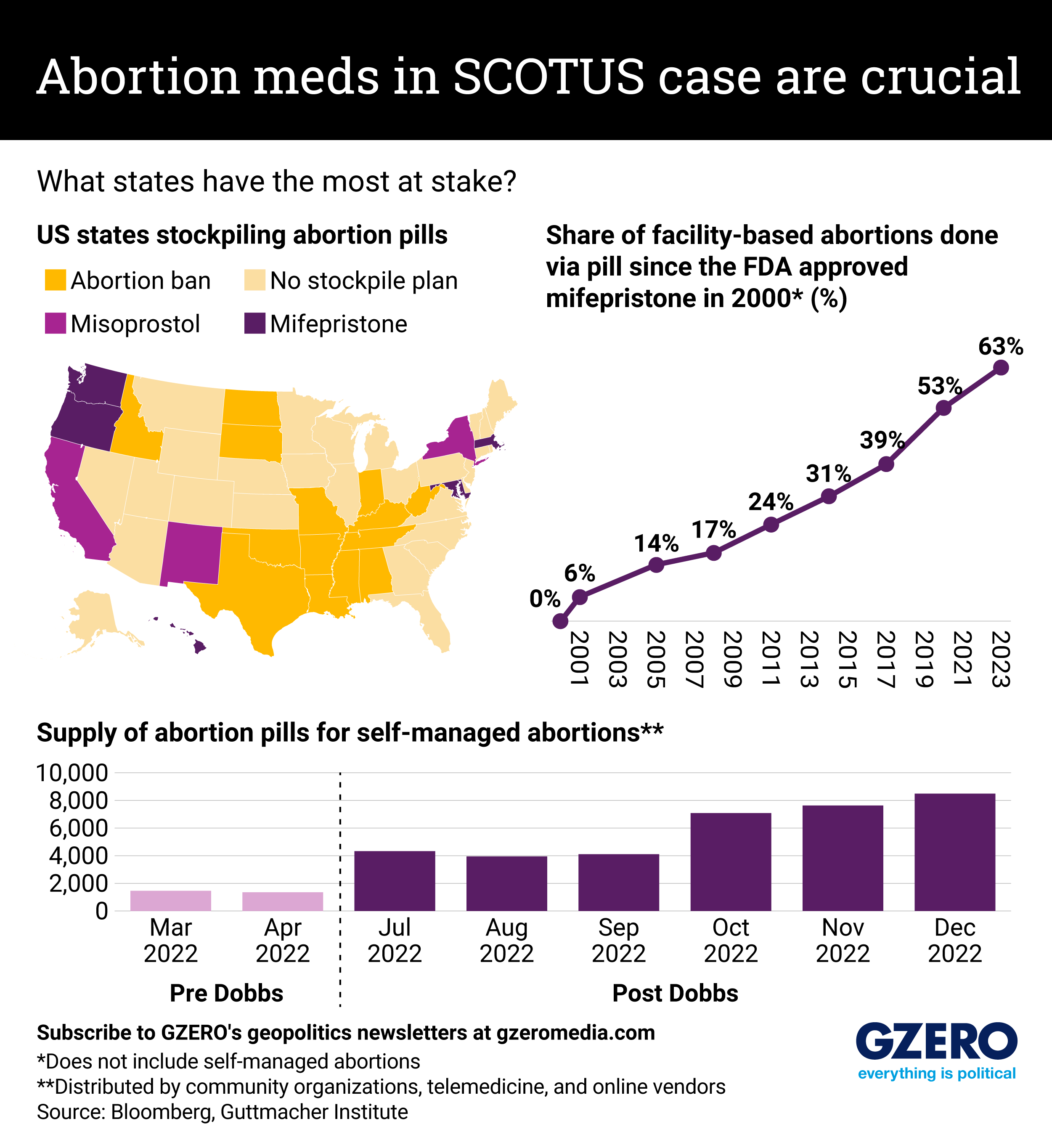The US Supreme Court heard arguments on Tuesday on whether access to mifepristone, an oral drug used to terminate a pregnancy, should be restricted. The drug works by blocking progesterone, a hormone that’s necessary for a pregnancy to continue. The case centers on whether changes the FDA made in 2016 and 2021, which broadened access to the drug, should be rolled back.
Since SCOTUS overturned Roe v Wade, which saw many states ban or impose more restrictions on abortion access, a rapidly expanding online and community-based network have been sending the pills through the mail into states with strict bans. Nearly 28,000 additional doses of pills intended for “self-managed” abortions were provided in the six months after the fall of Roe v. Wade — more than quadrupling the average number of abortion pills provided that way per month before the decision and suggesting that many women have turned to medication abortion to circumvent state bans.☰
More from GZERO Media
Courtesy of ChatGPT
OpenAI recently released its GPT-4o image-generation model, which is billed as more responsive to prompts, more capable of accurately rendering text, and better at producing higher-fidelity images than previous AI image generators. Within hours, ChatGPT users flooded social media with cartoons they made using the model in the style of the Japanese film house Studio Ghibli. The ordeal became an internet spectacle, but as the memes flowed, they also raised important technological, copyright, and even political questions, which Scott Nover explores this week in GZERO AI.
The flag of China is displayed on a smartphone with a NVIDIA chip in the background in this photo illustration.
Jonathan Raa/NurPhoto via Reuters
H3C, one of China’s biggest server makers, has warned about running out of Nvidia H20 chips, the most powerful AI chips Chinese companies can legally purchase under US export controls.
North Korean leader Kim Jong Un supervises the test of suicide drones with artificial intelligence at an unknown location, in this photo released by North Korea's official Korean Central News Agency on March 27, 2025.
KCNA via REUTERS
Hermit Kingdom leader Kim Jong Un has reportedly supervised AI-powered kamikaze drone tests. He told KCNA, the state news agency, that developing unmanned aircraft and AI should be a top priority to modernize North Korea’s armed forces.
The logo for Isomorphic Labs is displayed on a tablet in this illustration.
Igor Golovniov/SOPA Images/Sipa USA via Reuters
Isomorphic Labs, which broke off from Google's DeepMind in 2021, raised $600 million from investors in a new funding round led by Thrive Capital on Monday.
- YouTube
Elon Musk is the world’s richest man by far. He runs multiple companies, including SpaceX, Tesla, and X (formerly Twitter), with business interests all over the world. So why would the tech billionaire want to spend so much of his time focused on the complicated and often tedious work of overhauling the federal government through his Department of Government Efficiency (DOGE)?
U.S. President Donald Trump's adviser Elon Musk gives a check to an audience member during a rally in support of a conservative state Supreme Court candidate of an April 1 election in Green Bay, Wisconsin, U.S. March 30, 2025.
REUTERS/Vincent Alban
Palestinians mourn medics, who came under Israeli fire while on a rescue mission, after their bodies were recovered, according to the Red Crescent, at Nasser hospital in Khan Younis in the southern Gaza Strip March 31, 2025.
REUTERS/Hatem Khaled
15: Fifteen Palestinian medics who went missing last week were apparently killed by Israeli forces and buried in an impromptu mass grave along with their ambulances, according to the UN.
Saudi Crown Prince Mohammed bin Salman (also known as MBS) appointed Saudi Prime Minister, in a government shuffling announced by a Royal Decree, in Jeddah, Saudi Arabia, on September 24, 2022.
Balkis Press/ABACAPRESS.COM
After cutting Saudi oil production beginning in late 2022 to set a floor under slumping global oil prices, Crown Prince Mohammad bin Salman is set to change course.
Get insights from RBC Capital Markets’ experts on the evolving global trade dynamics and the potential effects of tariffs on the economy, financial markets, and across industries.
© 2020 GZERO Media. All Rights Reserved | A Eurasia Group media company.
